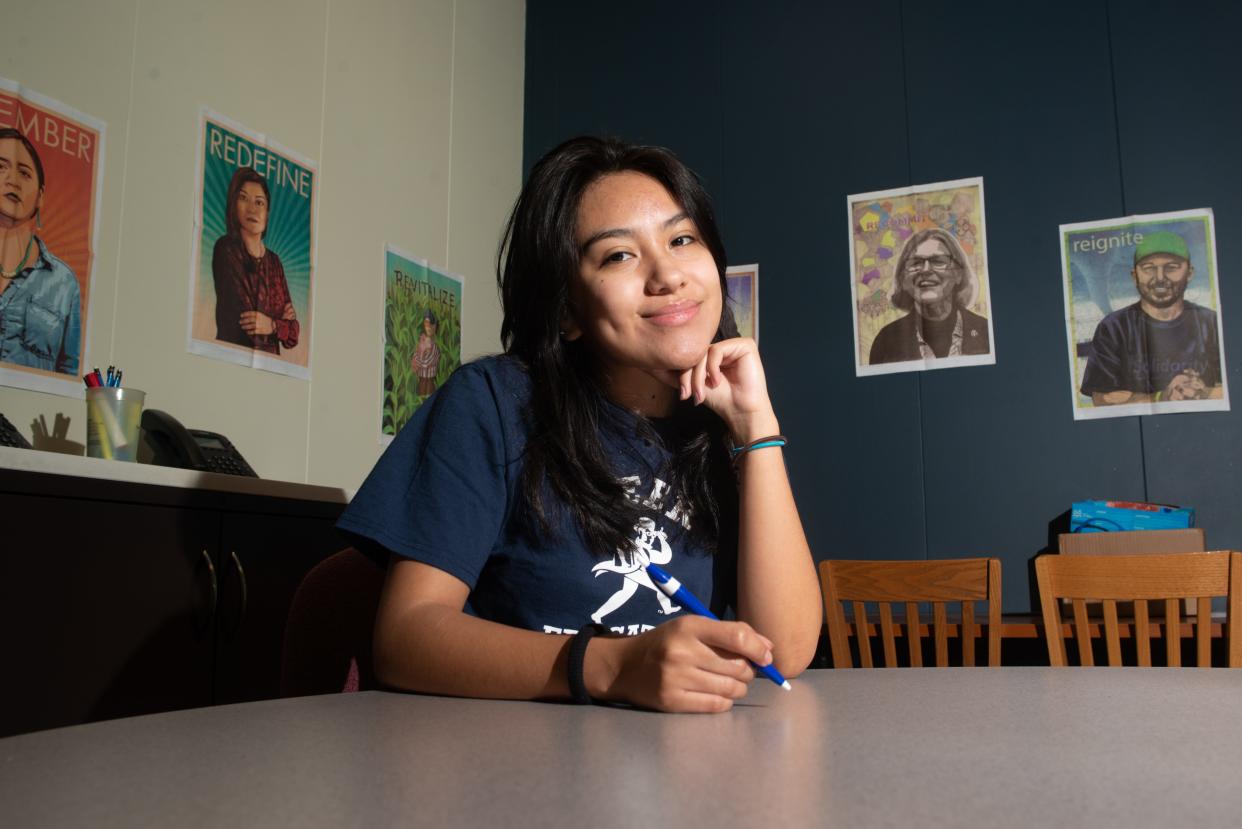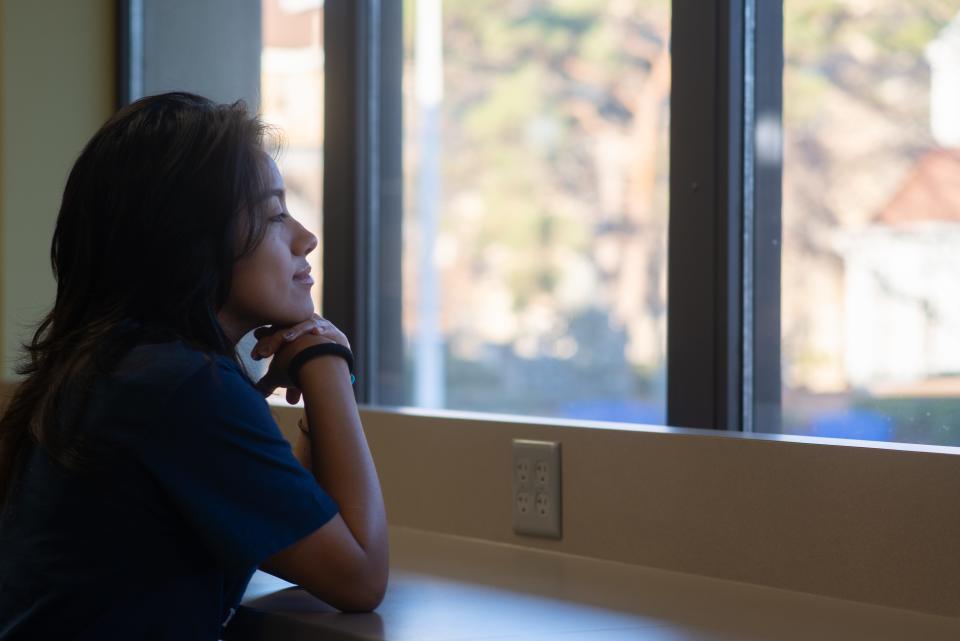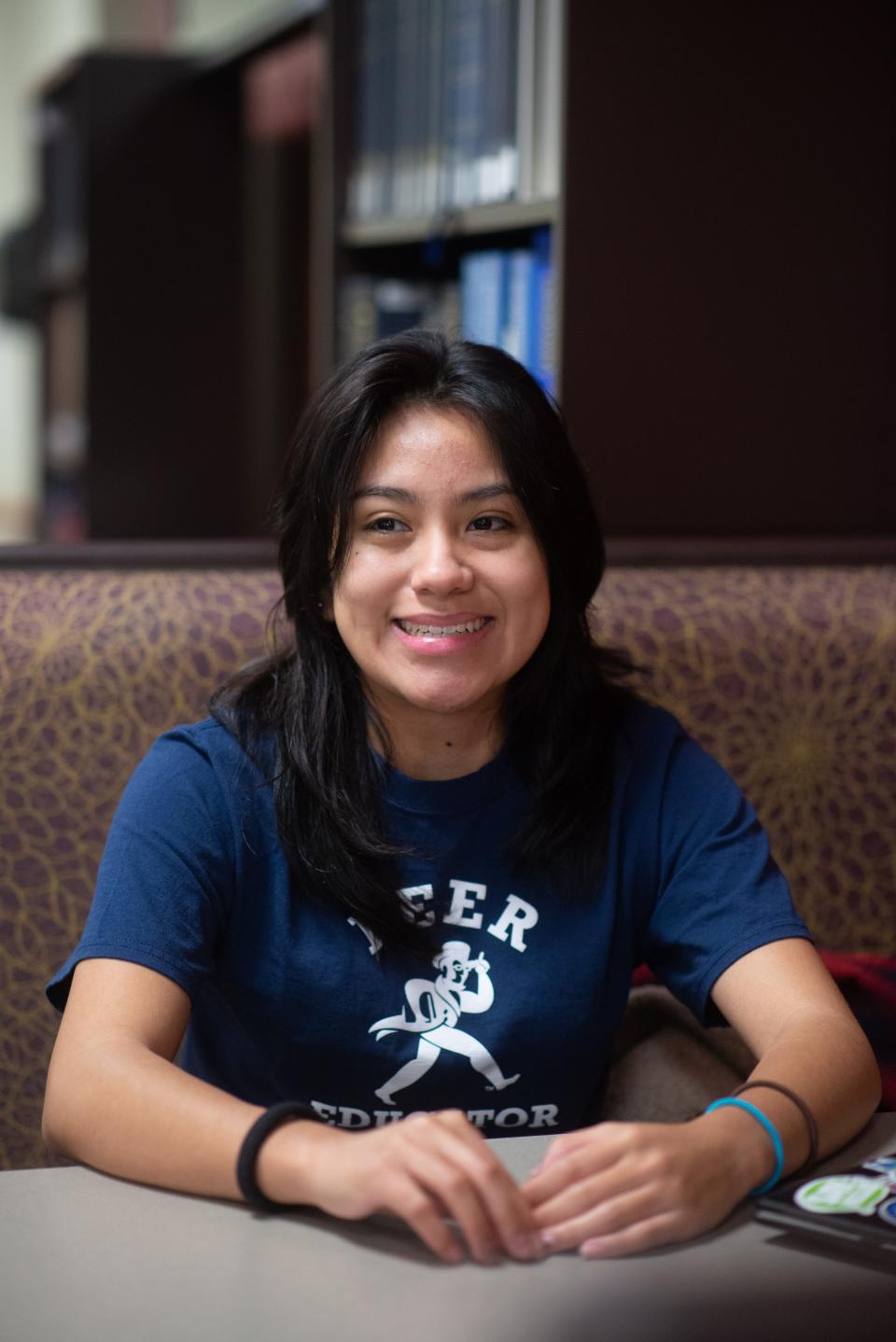Nearly half of Washburn students are first-generation. It's been a decade in the making.

Perla Soto belongs at Washburn University.
It took a few years for the college senior to know that. She still sometimes struggles to believe it. It's part of an implicit impostor syndrome that comes with the territory of being a first-generation student not just at Washburn, but really any college campus.
More:Former Washburn president Jerry Farley donates $2M for scholarships
"You feel like you don’t belong, even though you’ve struggled so hard to get where you belong," Soto said. "Even though I’d gotten so many scholarships and achievements, I still felt like I wasn’t worthy of going to college."
Soto is one of Washburn University's hundreds of students who are first-generation, meaning they are the first in their families to attend a college or university. According to a school survey earlier this semester, 47% of Washburn students identified themselves as first-generation.
But while other schools may see a hurdle in accommodating the needs of a generation of students who aren't as familiar with the bureaucracy, policies and structures of higher education, Washburn University sees an opportunity to distinguish itself, said Jennifer Wiard, assistant dean of student success.
"They have the most amazing work ethic, and they have the biggest dreams," Wiard said. "They want to give back to their communities, and the more first-generation students we can get to Washburn and graduate, the greater impact they’re going to have because they will reach back into their community, and Topeka will be a better place for it."
Push for first-generation students dates back a decade to Washburn University president Jerry Farley
Alan Bearman won't ever forget the meeting he was in a decade ago with former Washburn University president Jerry Farley.
The pair of Washburn administrators had been discussing the National Completion Agenda, a nationwide push to not only graduate more students, but identify the barriers that exist for students to finish their degrees or attend institutions of higher education in the first place.
More:Jerry Farley and Washburn University have been together for a generation. What comes next?
"Dr. Farley said, 'Alan, we have to figure out how to graduate more students,'" Bearman, now dean of the university's Center for Student Success and Retention. "My assumption then was that to graduate students, we just needed them to study more.
"But it turns out that when you start thinking about degree completion, there are a whole bunch of issues you have to address, and affordability is a big part of the equation, especially for so many of our first-generation students."
Bearman said the university has always had a keen emphasis on affordability, especially compared to pricier state universities east and west of the Topeka campus, but that focus has only become more important in the last decade as tuition has generally increased at colleges across the region and U.S.
For example, the university is one of the few, if not the only, universities in the region that does not charge for parking. Washburn officials are also quick to point out that the university only charges a single $55 student fee, compared to various fees other universities might charge, although Washburn does vary the price of actual credit hours between colleges.
More:Despite lower enrollment and higher tuition, Washburn University's budget appears rosier in 2022-23
"Everywhere else has turned to fees to increase their revenue, but we’ve never done that, and you can credit Dr. Farley and the board of Regents for that," Bearman said. "We did not chase those fees."
This year, the average in-state, undergraduate student living on campus will pay about $23,000 to attend Washburn, according to the university. That figure, though, includes residential and dining costs, and many of Washburn's students come from the Topeka area and live at home with their parents.
Beyond comparatively low tuition, Washburn also has worked to reduce other costs of living on campus, such as by pushing for more open-access textbooks and partnering with Topeka Metro to provide free rides to students.
This year, the university has allocated more than $54 million in federal, state, institutional and other types of awards, with over 90% of students receiving a merit-based scholarship between $1,000 and $5,000. Under a new scholarship scheme that no longer uses test scores and only takes into account high school grade point averages, Bearman said the university anticipates to increase that $54 million amount.
More:Washburn Law building won’t meet December timeline. Here's why it will be worth the wait.
A new pair of financial advisors at the university will also work with students and families to proactively work with students to get scholarships and grants, as well as helping them to better understand the full costs of attendance at Washburn.
All those initiatives, Bearman believes, have helped pull in the relatively high number of first-generation students to a university that was founded on the idea of open access.
"It’s always been a part of our history, but I think we’re telling that story a bit better — that you belong at Washburn, and we’ll help you and your family chart a pathway to success," Bearman said.
First-generation student success requires more than financial aid

For first-generation students like Soto, affordability is a big piece of getting students to the campus in the first place. A majority of Washburn students work more than 20 hours a week, said Wiard, the assistant student success dean, mostly off campus.
Anything the university can do to make that workload easier pays off dividends for students.
More:Washburn University plans to use $1M gift to build new presidential mansion next to campus
"A flat tire for many of our first-generation students can mean being forced to choose between paying rent, groceries or fixing the tire. And without that tire, you can't go to work, so you can't afford the others," Wiard, the assistant student success dean, said. "We try to have the financial supports in place to help students through some of those things that happen as an adult. We don’t want a flat tire to be the reason someone doesn’t graduate."
But keeping students at college requires a lot of other types of wrap-around support, especially when they struggle to make a clean transition from the structured system of their high schools to the independent responsibility that college life requires.
Families, while loving and supportive, often struggle to understand or be able to help their first-generation students with some of the "hidden rules" and curriculum decisions that exist in higher education, the assistant dean said.
"There are a lot of different bureaucratic systems and processes that can derail you just as easily as not being able to perform well on your exams," Wiard said.
For all students, the university offers WU 101: The Washburn Experience, a freshman-level class designed to help students transition to college life and set themselves on a path for success and graduation. The class teaches students about the "language of college" — such as the definitions of terms like "bursar" and "transcript" and when students might encounter them.
More:With new partnership, GO Topeka and Washburn School of Business see growth for community
Starting with this year's class, all incoming first-generation students are assigned a "student success coach" who meets with the student at least once a month to check in on academic progress and work through any stumbling blocks,
The hope, Wiard said, is that that partnership continues all the way through graduation. And it comes in addition to the university's existing academic advisors, who are trained to work with first-generation students.
"The university catalog is dense, and it is not easy to read, so for a first-generation student to crack that big thing open and figure out what classes they need to graduate can be really intimidating," Wiard said.
Beyond Washburn's Center for Student Success and Retention, the university has also sought to assist first-generation students and others who may have academic struggles by putting in supports like a math lab in the library.
For many students, a math requirement is often the last hurdle they need to clear before graduating, and the lab has both a director and math coach to assist students in passing any challenging math classes.
Like many other Kansas universities, Washburn has also moved away from remedial classes, which often impose a financial and academic barrier to students and don't count toward degree completion. In their place are co-curricular classes, which help get students caught up while earning college credit.
Elsewhere on campus, first-generation students have dedicated spaces, like their own residential community in the Living Learning Center and the Multicultural Intersectional Learning Space in the Memorial Union. Students of color, Wiard said, are historically more likely to be first-generation.
More:Who will Washburn's next president be? Regents will decide behind closed doors
“We know it can’t just be CSSR trying to help these students,” Wiard said. “If first-generation students are half of our student body, then it’s everyone’s job to think about how we can help first-generation students transition here, be successful while they’re here and eventually get to the graduation stage.”
Beyond the campus support structures, students like Soto know they're welcome just by virtue of being surrounded by other students who look like them and come from similar backgrounds.

Even if she occasionally struggles as a first-generation student, Soto is motivated to be the first one in her family to receive a degree in the U.S., and to make all she and others have sacrificed worth it.
"I do belong, and I do have a purpose," she said. "Even beyond that purpose of getting a degree, it’s knowing that I can help others if I can’t help myself."
Editor's note: A previous version of this story incorrectly stated the monetary amount of merit-based scholarships given by Washburn University.
Rafael Garcia is an education reporter for the Topeka Capital-Journal. He can be reached at rgarcia@cjonline.com or by phone at 785-289-5325. Follow him on Twitter at @byRafaelGarcia.
This article originally appeared on Topeka Capital-Journal: Washburn University first-generation students now nearly half

